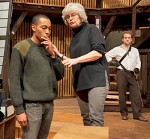Title
Two very different plays by William Shakespeare—one an engaging yet ambiguous “problem play,” the other one of his most familiar comedies—are being presented this month by Juilliard’s third-year actors (Group 41) as the culmination of a Shakespeare-themed year. Populated with large casts of colorful and strongly drawn characters, All’s Well That Ends Well and A Midsummer Night’s Dream offer ample opportunities for our actors to put their intensive training to the test.
Body
The idea of doing two Shakespeare plays in repertory was implemented five years ago by James Houghton, Richard Rodgers Director of the Drama Division, when he first came to Juilliard. His goal was to create an “immersive experience” for third-year actors, who have been studying Shakespeare all year in their acting classes. In this type of repertory presentation, each member of a group of actors takes part in both shows, usually with a leading role in one and a supporting role in the other. Since each actor has a key responsibility for carrying the play forward in one and providing support in the other, Houghton said, they learn never to be dismissive about the size of a part. Working under two directors simultaneously also helps students learn to adapt and adjust to different ways of working, an experience that will give them a real advantage, Houghton noted, if they get cast in productions by Shakespeare in the Park or other companies doing Shakespeare in repertory.
Its familiar title aside, All’s Well That Ends Well has not historically been one of Shakespeare’s most popular or frequently performed works, and it has been categorized by some critics for being, along with Measure for Measureand Troilus and Cressida, a “problem play” for its various interpretive challenges. One central issue is that Helena, the heroine, is desperately in love with Bertram, a cad who doesn’t deserve her. She wins his hand in marriage early on in the play, but he proves an unwilling and disloyal husband. Helena ultimately secures his sworn allegiance—hence the title—but was he worth it?
Juilliard faculty member Rebecca Guy, who is directing the production, noted that the play has become more popular in the last 25 years, perhaps because audiences have increasingly related to Helena, a character widely hated by earlier generations (famed Shakespearean actress Dame Ellen Terry reportedly called her “a doormat”). In a recent interview with The Journal, Guy, who is much more sympathetic, said she sees Helena as “determined but incredibly humble; a surprisingly modern woman who discovers her own agency over the course of the play.” As for Helena’s choice of Bertram, Guy admitted that “the ‘Why him?’ question is trickier.” She noted that except for Bertram and Parolles, everyone in the play means well, but she’s willing to give even them the benefit of the doubt. “They have to be enlightened [and] come to know themselves,” she said, a process that “sometimes has to be forced on us.”
Guy promised she won’t deliver what she described as “the dark, brooding, everybody’s-awful kind of production” to which the play has sometimes been subjected; instead she wanted the audience to feel the play is “very human; not false.”
The obstacles to amorous fulfillment in A Midsummer Night’s Dream are put forth and resolved in a much more whimsical fashion, as illustrated by the trials of another Helena. Also hopelessly in love with a man who has rejected her, the heroine of Midsummer Night’s Dream wins her lover back not through her own volition but through Puck’s magical ministrations (once properly dispensed).
This production is being directed by Andrew Borba, who has worked with several Juilliard faculty members during past summers in his capacity as associate artistic director of the Chautauqua Theater Company. “The subject matter allows you to go anywhere interpretively,” Borba observed (and as anyone who saw Joe Dowling’s 2006 hip-hop-inclusive production of it at Juilliard witnessed firsthand). In a recent phone interview, Borba said that he’s “not a conservative or traditionalist,” but that he does “start with the text” in his interpretation. It almost never works, he contended, when you try to impose your own artistic agenda on the play instead of using the text as your point of departure.
Shakespeare’s magical romantic comedy is also, in a word, strange. If you were a playwright trying to promote a play with this kind of plot today, Borba mused, you’d be flatly rejected, but “with Shakespeare, it completely works. It’s incredibly magical in a profoundly moving way; it’s human—everybody’s madly in love, and love is fickle.” While he didn’t want to give away too many production details, Borba noted that the play doesn’t have a highly sequential structure and that this production “very much embraces the flexibility of space and time.”
The set will be familiar to anyone who has attended Shakespeare rep productions at Juilliard in recent years. The design is based on London’s Globe Theatre, the playhouse that first was built to accommodate the performance needs of all of Shakespeare’s plays and where many of them were first performed. “One of the great things about repertory,” Borba remarks, “is that it really requires the audience to use its imagination.” Juilliard’s sets, he added, are “genius in that way.”
And of course the plays themselves are genius—and have lost none of their power more than 400 years after being written. As Samuel Johnson wrote in the preface to his 1765 edition of Shakespeare’s plays, “he never fails to attain his purpose; as he commands us, we laugh or mourn, or sit silent with quiet expectation, in tranquillity without indifference.”





